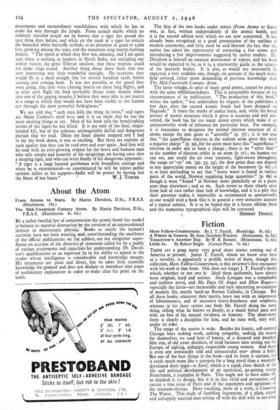Tiger, Tiger!
MAJOR Connirrr is a champion tiger-killer of India, but as Lord Linlithgow, who was Viceroy of India from 1936-43, points out in his appropriate commendatory foreword, Major Corbett is a very different man from the big-game hunters dear- to fiction whom dis- appointed love has driven to slaughter' rather than to suicide. We are, to our credit generally, as a rule lovers not destroyers of animals, but Major Corbett is a man of warmer 'sympathy than is common, and such is his love and admiration for the king and pride of the jungle that he kills even man-eating tigers with the deep regret of a man facing an unpleasant necessity. For, to him, it is an official job. He is called on by the Government of India to go wherever a district is suffering badly from a man-eating pest who has reduced villagers to a state of terror, and often compelled them to shut themselves up in their homes until they become insanitary. " Pest " is not too strong a word, for most of the tigers Major Corbett has killed have destroyed between sixty and a couple of hundred persons before their man-eating career has been brought by him to an end.
To at least one reader it was new to learn that man-eating is an abnormality in tigers ; they resort to it mostly by chance when maimed or mutilated, or reduced by old age and infirmities to inability to hunt their proper and habitual food. As Major Corbett says, "a tiger's function in the scheme of things is to help maintain the balance in nature and if, on the rare occasions, when driven by dire necessity, he kills a human being or when his natural food has been ruthlessly exterminated by man he kills two per cent. of the cattle he is alleged to have killed, it is not fair that for these acts a whole species should be branded as being cruel and bloodthirsty." But the bulk of this book is taken up not by Major Corbett's opinions but by his acts and his descriptions of the scenes in which they took place. Incidentally, therefore, his book will appeal strongly to all lovers of nature, for he has not only an eye for the flora and fauna of the country he has hunted, but a real gift of concise and telling description. This is perhaps the result of the slow and cautious
movements and extraordinary watchfulness with which he has to make his way through the jungle. From scratch marks which no ordinary traveller would see he knows that a tiger has passed the spot three days before, and while on the track of a tiger. he notices the beautiful white butterfly orchids, at an elevation of 4,000 to 5,000 feet, growing among the trees, and the mountain crag martin hunting insects. " The speed at which they flew was amazing, and I am quite sure there is nothing in feathers in North India, not excluding our winter visitor, the great Tibetan swallow, that these martins could not make rings round. Another thing about these birds that was very interesting was their wonderful eyesight. On occasions they would fly in a dead straight line for several hundred yards before turning and coming back. It was not possible, at the speed they were going, that they were chasing insects on these long flights, and as after each flight the bird inevitably thrust some minute object into one of the gaping mouths, I believe they were able to see insects at a range at which they would not have been visible to the human eye through the most powerful field-glasses."
We are told that " each man ,kills the thing he loves," and tigers are Major Corbett's chief love, 'and it is on them that he has the most exciting things to say. Most of his book tells the breath-taking stories of the tigers he has killed. It is not only of the final, single- handed kill, but of the arduous, unimaginably skilful and dangerous pursuit that we read. Often my heart almost stopped and I had to lay the book down, it was so exciting. But these are exploits of such quality that they can be read over and over again. And they will be read with an ever-growing respect for the brave and humane man who tells simply and honestly of his 'misgivings on having once shot a sleeping tiger, and who can write finally of his dangerous opponent: " A tiger is a large hearted gentleman with boundless courage and when he is exterminated—as exterminated he will be unless public opinion rallies to his support—India will be poorer by having lost



























 Previous page
Previous page